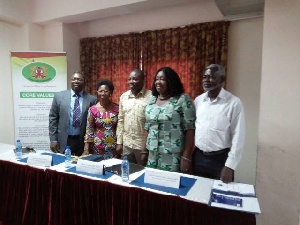Dr Mokowa Blay Adu-Gyamfi, the Director General of the Ghana AIDS Commission (GAC), says efforts at reducing new HIV infections within the population could not succeed without the provision of high impact HIV prevention services.
She has, therefore, tasked all stakeholders to be ready to change methods that are not working and scale up best practices to achieve the maximum desires in the fight against HIV/AIDS.
Dr Adu-Gyamfi was speaking at the launch of the Fourth National HIV and AIDS Research Conference (NHARCON) 2018 in Accra, on the theme: “Ending AIDS: Rethinking Practices for maximum impact.”
The conference, which is expected to commence on May 8 to 11, 2018, would act as a platform for researchers and stakeholders to share information and experiences, discuss results of research and examine their implication for the implementation of the current National HIV/AIDS Strategic Plan 2016 to 2020.
Dr Adu-Gyamfi said it was important that the Commission and its stakeholders subscribed to one monitoring and evaluation framework in reducing new infections.
She noted that the 2016 HIV Sentinel Survey Report has six regions with higher HIV/AIDS prevalence than the national prevalence of 2.4 per cent. The regions, she said, were the Volta, Brong Ahafo, Eastern, Ashanti Western and Upper West.
She said the Northern Region had the lowest prevalence of 0.7 per cent while the Volta and Brong Ahafo recorded the highest (2.7) per cent prevalence.
“Comparatively, HIV prevalence is higher in urban areas. The findings of the 2016 survey show the HIV prevalence in Ghana has been fluctuating despite stability demonstrated in some regions and an overall declining trend since the inception of the surveys.”
She said rethinking practices for maximum impact would require a collective and country-led movement to scale up HIV prevention programmes and services as part of fast-tracking a comprehensive response to meet global and national targets.
“I urge all of us to put in extra work to ensure that Ghana, as a country, will not be left behind in achieving the 90-90-90 fast track targets,” she said.
Mr Kyeremeh Atuahene, the Director of Research, Monitoring and Evaluation, GAC, said Ghana was creating an HIV/AIDS Fund to address the challenge of funding.
He said it was important that people sought medical attention on the pandemic and desist from jumping from one prayer camp to another in search of treatment.
Professor Isabella Quakyi, the Chairperson NHARCON Committee, suggested that the test for HIV should be made mandatory nationally so that all people would know their HIV status.
Health News of Sunday, 22 October 2017
Source: ghananewsagency.org
Prevention services needed to reduce new HIV infections
 The conference is expected to commence on May 8-11, 2018 and would act as a platform for researchers
The conference is expected to commence on May 8-11, 2018 and would act as a platform for researchers
















